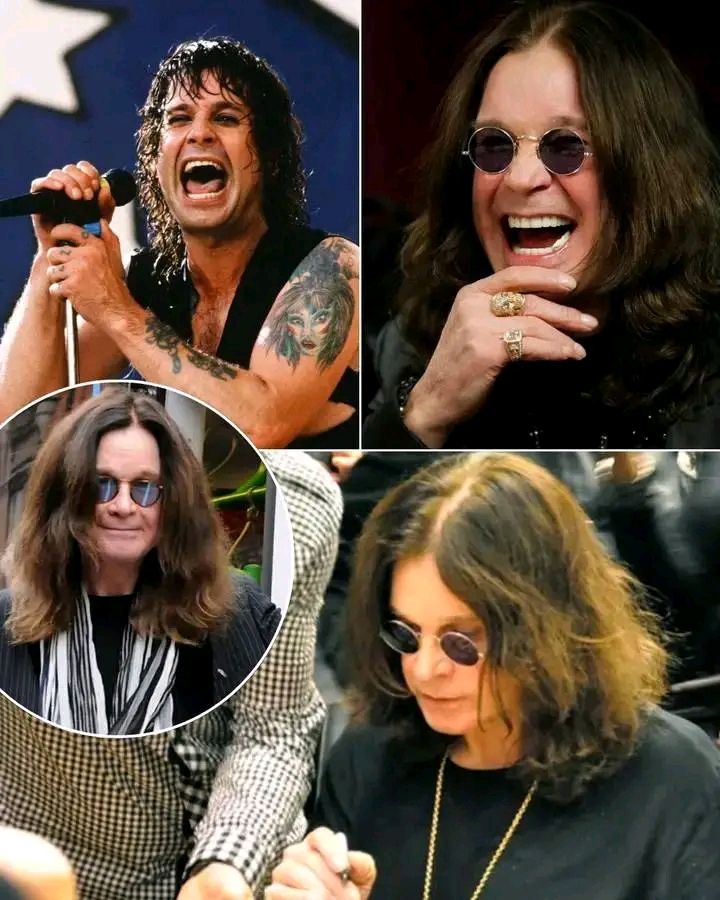Ozzy Osbourne didn’t just perform “Iron Man.” He *became* it.
On the final night of his final show, the world stood still. The air buzzed with something more than electricity, more than nostalgia — it buzzed with reverence. The crowd had gathered knowing this would be the last time they would see the man who had helped shape the very foundation of heavy metal. But what they received was more than a concert. It was a reckoning, a resurrection, and a farewell stitched into one.
The stage was quiet at first. A slow, heavy hum of feedback rolled across the arena like a thundercloud. Then, through the fog and flame, a figure emerged — not a young man, not even the Ozzy of a decade ago, but something different, something more.
He stepped forward like a soldier returning from a lifetime of war — back arched slightly from the weight of his years, yet eyes alight with the fire that had never truly left him. The spotlight hit his face, and for a moment the mask of time fell away. There stood the “Prince of Darkness,” leather-clad and untamed, worn but unbroken. The crowd erupted, not just in applause, but in awe.
He didn’t speak at first. He simply raised one hand to the sky, a silent invocation, and the first distorted chords of “Iron Man” tore through the night.
And then — he sang.
Not like he did in the ’70s, not even like he did in the 2000s. No, this was something deeper. Each word was carved, each line a blade. His voice cracked in places, rough with age, but behind that was something that transcended time — a cry not of weakness but of will. A declaration that he was still here. Still standing.
The song, long known as one of Black Sabbath’s most iconic anthems, took on a new shape that night. It was no longer just a tale of vengeance and isolation. It was an autobiography. It was every fight Ozzy had endured — the drugs, the fame, the madness, the exile and the return, the disease eating away at his nerves. Every scream echoed with defiance, as if daring life itself to take him down.
In that moment, Ozzy was no longer just the voice of a song. He was the song. His silhouette, framed by flame and smoke, became a living monument to the spirit of rock ‘n’ roll — not the commercial product sold in stores, but the raw, chaotic, defiant soul of it. The soul that never conforms, never quits, and never dies.
The crowd wasn’t just watching. They were witnessing. Many had grown up with Ozzy’s music — in bedrooms, in garages, on long drives, on sleepless nights. And now, as he howled into the dark one last time, they saw not a man faltering, but a man transforming into myth.
Each chorus hit harder than the last. “I am Iron Man…” echoed like a prophecy fulfilled. The giant screens behind him showed flashes of his past — grainy footage of young Ozzy screaming into a mic, clips of chaotic tours, madcap interviews, tearful reunions, solemn hospital visits. The montage didn’t play to glorify him. It played to *complete* him. To show the world that this man who had once been dismissed as reckless and dangerous had lived every inch of his truth.
And then came the moment — the final note.
Ozzy stepped forward, eyes scanning the crowd as if trying to memorize every face. He raised his arm again, slowly, deliberately. The crowd responded instinctively, thousands of arms lifted toward him in return. And for one eternal second, time froze. There was no music. No sound. Just that connection — a sea of souls reaching out to the one who had carried their pain, their rebellion, their fire.
Then the lights faded. Not all at once, but gradually, like a setting sun.
No encore. No final speech.
Just darkness.
It wasn’t needed. Everyone understood. That was the encore. That was the speech. When Ozzy exited the stage, he didn’t just leave the venue — he ascended into legend.
Backstage, there were no tears from him. He sat quietly for a while, sipping tea, a half-smile curling on his lips. “That was it,” he said to Sharon, seated beside him. She nodded, gripping his hand. “That was everything.”
News of the performance spread fast. It wasn’t just written about in magazines or blogs. It was spoken of like folklore. People didn’t just say, “Ozzy’s last concert was amazing.” They said, “You had to *feel* it. He became Iron Man.”
Some who hadn’t been there said it sounded too perfect to be real. But those who *were* there knew. They had witnessed not just a farewell, but a transformation. Not a fall, but a rise.
In the weeks that followed, videos of the performance went viral. Artists from all genres paid tribute. Even those who had never listened to Black Sabbath found themselves drawn into the mythos — not just of the music, but of the man. A warrior of noise and night, who had screamed his truth into the void for half a century.
And in the hearts of fans, “Iron Man” changed forever.
It wasn’t a song about vengeance anymore. It was a hymn for every person who had faced hardship and refused to bow. A soundtrack for those who had been broken and rebuilt. It was a song about survival, resilience, and the soul’s refusal to fade.
Years later, in murals and statues, in documentaries and books, Ozzy’s final performance would be remembered. But not with sadness.
With fire.
Because in that last, searing moment, when the guitar wailed and his voice tore open the heavens, he reminded the world of something crucial:
Legends don’t die.
They become the music.
And for Ozzy Osbourne — the man who was never supposed to last, yet did — the song was never just a hit.
It was prophecy.
It was battle cry.
It was life.
He *was* Iron Man.
Let me know if you’d like th
is adapted into a video script, article, or even a graphic novel format.









